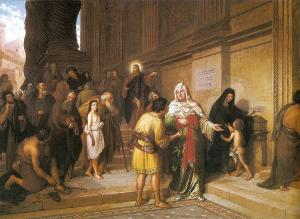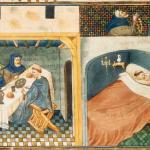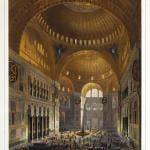
On Wednesday, two customers in an Oklahoma City McDonald’s shot at employees. They were not practicing social distancing properly; those working under the golden arches told them so, and so—shots fired:
The suspects got angry and took out a gun when they were asked to leave due to coronavirus restrictions that were in place, Oklahoma City Police Lt. Michelle Henderson told CNN.
Two workers were shot and a third was injured, Henderson said, during “the melee that ensued.” Police told CNN affiliate KOCO that one of the victims was shot in the leg while the other was shot in the shoulder. Both injuries are considered non life-threatening, the affiliate reported.
Police at the scene also said a female employee sustained lacerations to her head, KOCO reported. (“Customers shot 2 McDonald’s employees after being told to leave due to coronavirus restrictions”)
Other incidents of this kind abound. There was the California man who went to a grocery store in a Ku Klux Klan mask (perhaps some sort of play on the idea of “having to wear a mask”). And who could forget (or, at this point, remember) the disgruntled, mask-less gentleman who wiped his nose on a Dollar Tree employee’s shirt? A security guard is dead because he told some people they couldn’t stay in his store without covering their faces.
America is a bratty child. Perhaps it has always been so. We often tell a story about principles, about noble resistance to tyranny, about a lack of representation—these are the roots of our nation. Maybe. Others might say a bunch of well-off Bostonites dressed up as natives because they didn’t care for being forced to accept anything, even if at a cheaper price.
I won’t be so bold as to attempt a summary of the American founding in a blog post. The colonists were a diverse coalition—from the “Christian Spartan” Samuel Adams to the principled, not-so-principled Deist Thomas Jefferson. What is clear is that, if one so wished, one could tell a story of us as, from the beginning, a bratty nation turned bratty empire.
And yet, this feels different. Getting shot over McDonald’s during a global pandemic is an entirely different level of entitlement. We’ve all seen the signs “I need a haircut,” “massage is essential”—these sorts of things. No doubt such protesters are a small portion of the population; I also have no doubt that many Americans are chafing under quarantine not merely because they may be experiencing economic woe but, more likely, because they resent being told what to do. We, it seems, resent it so much that we would rather risk getting (and perhaps spreading) a virus for a quarter pounder or a foot rub. Life is worth a Big Mac. Death is worth a Big Mac. Life and death are worth one Big Mac.
But this blog post is not a hitjob, not some cheap shot out of anger at the land of my birth and succor. As suggestive as our worst impulses seem to be, they are, if only opaquely, an expression of a larger issue we face: eventually we will need to revivify with the economy again, will need to reopen, will need to “get back to it.”
All reasonable people can agree on this, no? People are losing their jobs, their livelihoods, their senses of worth and self—they’ve no way to make money, after all. Yes and no. It’s true that many people are being hurt by the current quarantine; it’s true that we stand at a critical juncture when suffering seems poised to explode in a way unseen since, perhaps, 2008—probably before. We face both a “9/11 a week” and mass unemployment—another stagflation crisis may follow soon after. The future may, some think, be apocalypse, be an unveiling, be a time when little hope may remain for millions and millions.
This all sounds very convincing, undoubtedly. “We must reopen relatively soon. Sure, what we see in McDonald’s and Dollar Trees across the nation is unacceptable, but it is no expression of American rebelliousness or immaturity—it is the last-ditch impulse of the suffering!” Never mind, of course, that we have no way of knowing if such protesters are actually poor and downtrodden (or whether they, like many of the politically active in this country are well off. We seem to forget that suburbia is filled with upper-middle- and upper-class people living in McMcansions). Never mind that we could do more to help people directly, rather than simply gawk as they suffer.
What matters here is that our imagination is so limited—this seems to signal the final breaths of an empire, an inability to adapt to circumstances, buckling under the morbid weight of decades, if not centuries, of bratty blubber. Our minds jump to only two possibilities: sacrifice on the altar of economic renewal or cascade into a depression beyond our wildest imaginings. This is about it: blood must pour down the skyscraper temple mount or we must wander in the desert, manna-less and with no Moses to whack water from a stone.













